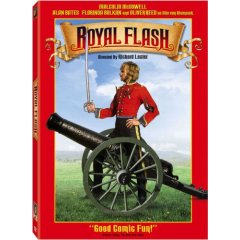Off the top of my head, I can’t think of a finer literary creation than George MacDonald Frasier’s Sir Harry Paget Flashman. Well, to be technical, Flashman first appeared in Thomas Hughes’ 1857 novel Tom Brown’s Schooldays, in which he was an upperclassman who bullied and tormented the book’s young protagonist. When last seen in those pages, Flashman had gotten stinking drunk and then received his comeuppance, being expelled from the school the two were students at. Fraser, however, took this character and wondered what happened to him as a adult. In a long series of books (although not long enough), we his fervent readers find out.
A member of the British Army (and various other organizations) in the latter half of the 1800s, Flashman is one of the most reprehensible characters imaginable. He is a coward of the worst order; a drunk, thief, racist, backstabber, womanizing, bullying cad. During his documented career he has committed murder, rape and been guilty on several occasions of treason. He has gleefully sent people to horrible deaths for no better reason than personal pique.
The one thing he isn’t, at least in his lengthy series of ‘memoirs,’ is a hypocrite. Now, for some reason, we as a society seem to have largely accepted the idea that hypocrisy is the single greatest moral taint. It says something actually kind of frightening that despite all of Flashman’s many, many crimes and gross moral failings that the reader remains ready at nearly every juncture to forgive him and hope for his continued survival and success. On the other hand, despite usually being vouchsafed from the very worst fates he is often threatened with, Flashman does experience a lot of misfortune over the years (all of it richly deserved), and is often driven nearly mad by his own sniveling cowardice.
I should mention the books are largely comedic in tone, and hilarious a series as you’re likely to come across.
Aside from penning one of the great ongoing characters of 20th century literature, Fraser’s appeal rests also on his amazing historical research. Flashman’s decades-long career, in which like a malign Inspector Clouseau he always ends up increasingly revered and successful despite his manifold failings, spans nearly the entire world. Despite his best efforts, Harry is dragooned into about every military conflict the British Empire, among other countries (including America during the Civil War), was about in those days. And this was a period when the British Empire was very busy indeed. During these unwanted adventures, Flashman meets just about every real-life person of the period that you can imagine, especially if you have any grasp of British military history.
Several years ago, I learned they had made a Flashman movie back in the ’70s, but was never able to dig up a copy. It recently came out on DVD, however, so I was able to give it a look. Sadly, it’s not very good. Directed by Richard Lester (A Hard Day’s Night), the film was, like most of his films, an antic, silly farce. Flashman is reduced to a clown, which he never becomes in the books.
The problem is exacerbated by the mis-casting of Malcolm McDowell in the part. Part of Flashman’s grand and ongoing success in British society rests on his imposing physique. He looks the very model of a broad shouldered, striking British hero, and that alone gets him by in many situations, especially after he bumbles and betrays his way into a vastly unearned reputation for tremendous gallantry. (Personally, I always pictured somebody like Nigel Greene in the part.) The rather runty, normatively unattractive McDowell outwardly personifies what should be the inner Flashman. That just doesn’t work. Flashman is a canny fellow, which partly explains his continued existence over the years. McDowell, like the rest of the film, is much too overtly ‘comical.’
Based on the second novel, which was basically a take-off on the Prisoner of Zenda, Flashman runs afoul (after some ill-advised chicanery) of Otto Bismarck, back before Bismarck was in important figure. Bismarck doesn’t forget, however, and years later (as often happened to Harry), chickens come home to roost. Flashman looks just like a pivotal royal personage, and is forced to substitute himself in that man’s place. After the usual string of brushes with horrible deaths and sexual encounters, Harry continues on his way.Bismarck is played by Oliver Reed here (who frankly would have been a far superior Flashman than McDowell), and is easily the best thing in the film. At least partly, this is because he alone plays his character in a deadly serious fashion. Other joys include appearances by a young Bob Hoskins and cinema’s most famous Scrooge, Alastair Sim.
The disc is nicely plush, with a few short documentaries and a McDowell commentary. From this, I learned that Fraser (who scripted the film) rather still likes it, and that McDowell, for all his flaws in the role, is a huge Flashman fan. Even so, it is with much regret that I find I must join the general consensus and dub the film a woefully missed opportunity. Hopefully somebody else, perhaps British TV (which has done so well recently with characters like Horatio Hornblower and Richard Sharpe), will try again and do better by old Harry.
By the way, seek out and read the books. They are tremendous.

